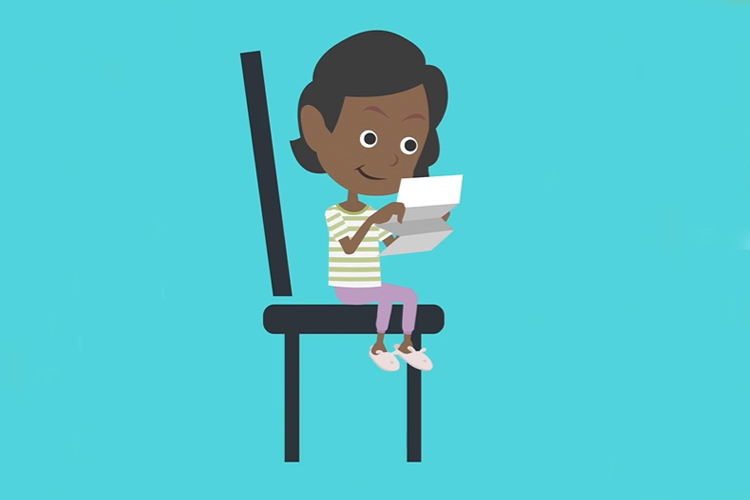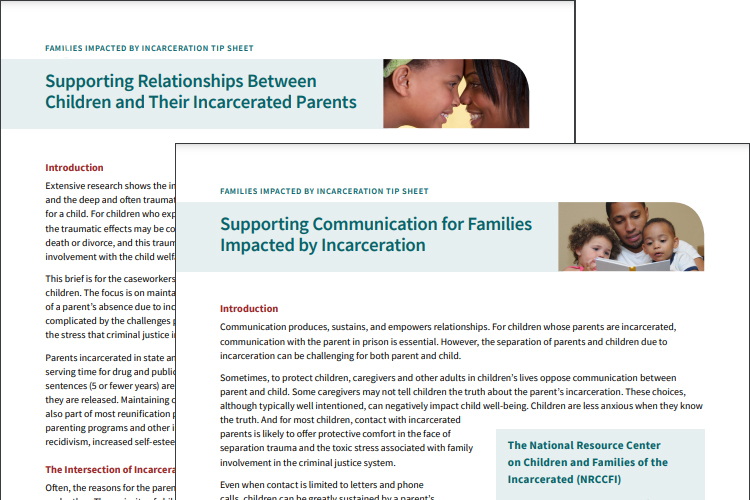Families Impacted by Incarceration
- Home
- •
- Topic Areas
- •
- Families Impacted by Incarceration
In the United States today, more than 5 million children, or 7% of all children, have a parent who is or has been incarcerated. Data from the Adoption and Foster Care Analysis and Reporting System (AFCARS) shows that about 8% of children who enter foster care do so as a direct result of parental incarceration. In many more cases, parental incarceration is one of several stressors that decrease family stability and contribute to child welfare involvement. Nearly half of the children in non-parental care have experienced parental incarceration at some point in their lives
Featured Resources

Keeping Families Connected: Supporting Parenting in the Context of Incarceration
Our conversation to explore strategies to support families dealing with the stress of the loss of a parent to incarceration.

Families Impacted by Incarceration Videos
The loss of a parent to incarceration means a crisis for a child. Learn more about how to help children and families communicate and cope.

Families Impacted by Incarceration Tip Sheets
These tip sheets, produced in cooperation with the National Resource Center for Children and Families of the Incarcerated, provide strategies for maintaining the bond between children and an incarcerated parent.
Complete List of Resources
Videos and Social Media
- Helping Children Plan for Communication
- 4 Tips for Supporting Effective Visits with an Incarcerated Parent
- 5 Tips on Communication by Mail
- Coming SoonFamilies Impacted by Incarceration Social Media Gallery
Spread the word on the importance of helping incarcerated parents and their kids keep in contact with these social media assets. - An Unlikely Partnership Film and Discussion Guide
This short film, part of the Building Community, Building Hope series, highlights a collaboration between the State of Washington’s Department of Early Learning and Department of Corrections to help keep families together during the incarceration of a parent.
Tools and Tipsheets
- Families Impacted by Incarceration Tip Sheet Series
These tip sheets, produced in cooperation with the National Resource Center for Children and Families of the Incarcerated, provide strategies for maintaining the bond between children and an incarcerated parent. - Strengthening Families, Saving Money [PDF]
Learn how the state of Washington launched a successful program to allow parents to serve their sentences from home with their children. - From the Field: Supporting Families Impacted by Incarceration [PDF]
A two-part Digital Dialogue with Ann Adalist-Estrin, director of the National Resource Center for Children and Families of the Incarcerated
Digital Dialogue Recordings
- NewKeeping Families Connected: Supporting Parenting in the Context of Incarceration
Our conversation to explore strategies to support families dealing with the stress of the loss of a parent to incarceration. - Keeping Strong Connections: Supporting Incarcerated Mothers and their Children
The Aid to Incarcerated Inmate Mothers program in Alabama helps incarcerated mothers and their children stay connected by providing education, facilitating visits, working with extended family, and supporting reunification once women leave prison.
External Resources
Partners
- Children of Incarcerated Parents Myth Busters
Federal Interagency Reentry Council
The Reentry Myth Busters clarify existing federal policies that affect individuals who were formerly incarcerated and their families. - Coping with Incarceration
Sesame Street Communities
These resources, include kid-friendly videos and activities to help young children (3–8) express and deal with the emotions involved when a parent is incarcerated.

